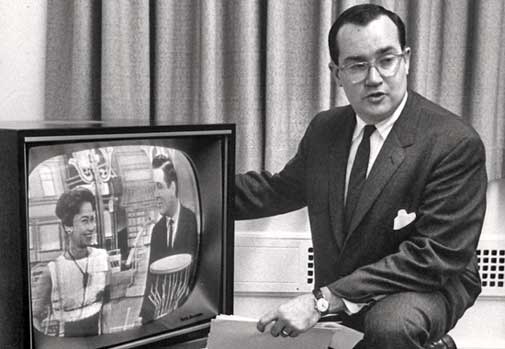
Fifty years ago today [Monday], new Federal Communications Commission chairman Newton Minow (above) gave his inaugural speech to broadcasters, and coined a durable phrase that rattled them a bit by describing what they presented on their TV stations as a "vast wasteland."
And that was half a century BEFORE Snooki...
The "vast wasteland" insult is a memorable one, but it wasn't the only, or best, point made by Minow in his May 9, 1961 address to the National Association of Broadcasters. Context is everything -- which, come to think of it, is another of the points John F. Kennedy's aggressive new FCC chair was trying to make that day.
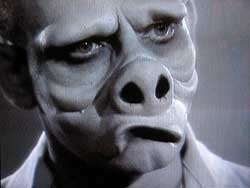
Minow didn't hate television, and, in fact, found lots to praise about it, from news documentaries and variety specials to The Twilight Zone (right). What he most resented, though, was the overall lack of quality -- the low average if you took all of TV's output into account.
He challenged the station owners to watch their own offerings, from start to finish, for one day. Not just the best show, or the worst, but all of it. That's where his famous phrase came from, and the context in which it makes perfect sense.
"When television is good," Minow told them 50 years ago, "nothing -- not the theater, not the magazines or newspapers -- nothing is better.
"But when television is bad, nothing is worse. I invite each of you to sit down in front of your television set when your station goes on the air and stay there, for a day, without a book, without a magazine, without a newspaper, without a profit and loss sheet or a rating book to distract you. Keep your eyes glued to that set until the station signs off. I can assure you that what you will observe is a vast wasteland."
And Minow continued, further defining his own phrase:
"You will see a procession of game shows, formula comedies about totally unbelievable families, blood and thunder, mayhem, violence, sadism, murder, western bad men, western good men, private eyes, gangsters, more violence, and cartoons. And, endlessly, commercials -- many screaming, cajoling, and offending.
"And most of all, boredom. True, you'll see a few things you will enjoy. But they will be very, very few. And if you think I exaggerate, I only ask you to try it."
Tune to a local broadcast station today, and watch for a full day and night, and you'll notice how things have changed in 50 years. These days, there aren't as many Westerns.
Otherwise, it's the same painful video death march.
Things have gotten better, though, not worse, when it comes to the quality of the best programs on television. On broadcast TV, the best of prime time in 2011 is very good indeed. And on cable, where restrictions are freer, it's even better. The "vast wasteland" was a narrow strip of landscape, a fenced-in line of local broadcast TV stations. Cable, when it finally arrived, held with it the promise of Kennedy's New Frontier.
But cable, too, can be just as worthy of Minow's scorn. Yes, it'd be easy to watch a full day of Turner Classic Movies, for example -- but I couldn't get through a full day's worth of E! or VH1 or even MTV without stopping several times to shower. It's when television not only hits the lowest common denominator, but aims for it, that I most embrace and understand the whole "vast wasteland" thing.
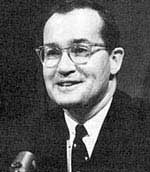
There are other remarks Minow made 50 years ago that are just as worthy of repeating -- and, it's sad to say, are just as applicable in this new century.
-- About local station owners and their responsibility to serve the public interest: "The public is your beneficiary. If you want to stay on as trustees, you must deliver a decent return to the public -- not only to your stockholders."
-- About ratings and popularity of TV shows: "A rating, at best, is an indication of how many people saw what you gave them. Unfortunately, it does not reveal the depth of the penetration, or the intensity of reaction, and it never reveals what the acceptance would have been if what you gave them had been better -- if all the forces of art and creativity and daring and imagination had been unleashed. I believe in the people's good sense and good taste, and I am not convinced that the people's taste is as low as some of you assume."
-- About pandering to the audience: "It is not enough to cater to the nation's whims; you must also serve the nation's needs."
This attitude is nothing new. In fact, it wasn't even new when Newton Minow said it in 1961.
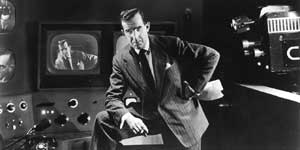
Three years earlier, in a 1958 speech before the Radio and Television News Directors' Association, Edward R. Murrow -- the most respected and accomplished newsman in the history of broadcasting -- scolded his audience about squandering an opportunity to take full advantage of this new medium of television.
This speech, too, contained a phrase that has been remembered and repeated over the decades: Murrow's famous "lights and wires in a box" warning.
"This instrument can teach, it can illuminate; yes, and it can even inspire," Murrow said then. "But it can do so only to the extent that humans are determined to use it to those ends. Otherwise it is merely wires and lights in a box."
And Murrow in his speech, like Minow in his, had a lot more to say as well.
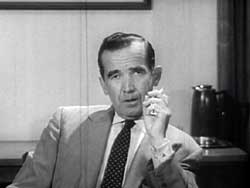
-- He looked at a full week's TV programming on the network level, rather than one day at a local station, and complained of a string of "decadence, escapism, and insulation from the realities of the world we live in."
-- He challenged the makers of TV to "produce some itching pills rather than this endless outpouring of tranquilizers."
-- He warned, long before the news divisions of TV networks became profit centers, that "one of the basic troubles with radio and television news is that both instruments have grown up as an incompatible combination of show business, advertising and news. Each of the three is a rather bizarre and demanding profession. And when you get all three under one roof, the dust never settles."
-- And finally, Edward R. Murrow concluded by noting, "The trouble with television is that it is rusting in the scabbard during a battle for survival."
You can read Murrow's entire "wires in a box" speech, and hear excerpts of it, by clicking HERE.
And you can read and hear Minow's entire "vast wasteland" speech by clicking HERE.
Both are inspiring reads, and depressing ones. We've come so far, yet learned so little. The best of cable, and even broadcast, has achieved the high standards to which Minow and Murrow aspired -- yet so much more, on so many more broadcast and cable outlets, have made the mind-numbing wasteland even more vast than before.
While some in TV news and entertainment have given us their, and the medium's, best, others have been content, or driven by greed, to settle for less, and expect us to do the same.
In short, they're trying to pull a vast one on us...